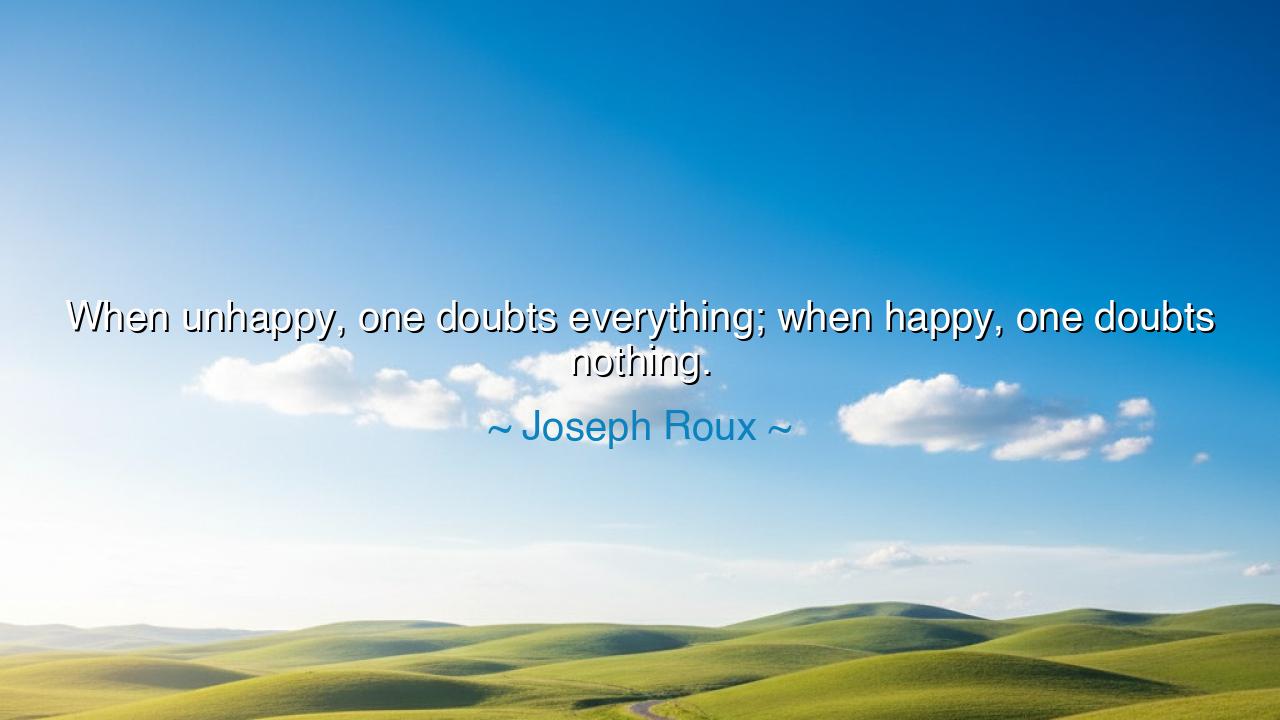
When unhappy, one doubts everything; when happy, one doubts






“When unhappy, one doubts everything; when happy, one doubts nothing.” Thus spoke Joseph Roux, the 19th-century French philosopher and priest, whose insights into the human heart burn with quiet precision. In this short and simple statement, he reveals one of the deepest truths about the nature of the human mind: that our emotions shape our perception of truth. When the heart is clouded by sorrow, all things appear uncertain; when the soul is bathed in joy, all things seem sure. Happiness gives us faith in life, in people, and in ourselves; unhappiness corrodes that faith, turning even light into shadow.
Roux understood that doubt is not born only of reason, but of the spirit’s condition. When we are unhappy, the world mirrors our inner turmoil. We question our choices, our friends, our destiny. The same words that once comforted us now sound hollow; the same faces that once smiled upon us now seem distant. This is the blindness of despair—it makes even truth appear false. Yet when happiness fills the heart, doubt vanishes. In moments of joy, everything aligns: love feels eternal, purpose feels clear, and the universe seems benevolent. We do not question the good when it shines upon us; only in darkness do we question the existence of light.
In Roux’s time, France was a nation of turbulence—political upheavals, social unrest, and moral questioning. As a priest and thinker, he saw how people’s faith in God and in one another wavered with the tides of fortune. In suffering, they cursed heaven; in joy, they praised it. This inconsistency, he realized, was not hypocrisy but the mark of human frailty. The heart governs the mind more than we admit. We imagine that truth and faith are fixed, but they bend beneath the weight of emotion. Happiness expands our vision; unhappiness narrows it. Thus, he wrote his warning—not to condemn, but to awaken compassion for the human condition, which sways between certainty and doubt like a ship between waves.
Consider the story of Helen Keller, born into silence and darkness. As a child, shut off from sight and sound, her world was confusion—a prison of isolation. She doubted everything: language, connection, even her own existence. But when her teacher, Anne Sullivan, broke through that wall with the gift of words, the darkness dissolved. With understanding came joy, and with joy came faith—faith in learning, in people, in life. From that moment, Helen no longer doubted her purpose. Her story shows what Roux meant: that happiness restores belief, and that despair, when it rules, can make even the possible seem impossible.
The quote also whispers a profound warning: that happiness, though precious, can make us blind. When joy floods our hearts, we often cease to question, cease to think. We trust easily, we overlook faults, we mistake comfort for truth. The ancients knew this danger. The Stoics taught that joy and sorrow are both illusions that distort perception, that wisdom lies in seeing clearly through both. Thus, while Roux’s observation is true, it is also incomplete unless we remember this balance: we must not let unhappiness drown our faith, nor happiness dull our discernment.
In every age, people search for certainty, not realizing that certainty is an emotion, not a fact. When the heart is content, the world feels right; when the heart aches, the same world feels wrong. The wise learn to separate what they feel from what is. To live by emotion alone is to be tossed endlessly by circumstance. True peace arises not from fleeting happiness, but from inner steadiness—a calm faith that neither joy nor sorrow can destroy. That is the strength of the awakened soul: to remain faithful even in despair, and thoughtful even in delight.
So let this teaching be passed on to those who seek clarity: do not trust your doubts in sorrow, and do not trust your certainty in joy. When unhappy, remember that darkness distorts your vision; wait for the dawn before you decide. When happy, remember that light can also blind; remain humble and mindful. Cultivate an inner balance, where joy does not intoxicate and pain does not corrupt. For as Joseph Roux teaches, the heart’s weather changes endlessly—but wisdom lies in seeing beyond it, in holding to truth even when emotion sways, and in keeping faith when the winds of doubt blow cold.






AAdministratorAdministrator
Welcome, honored guests. Please leave a comment, we will respond soon